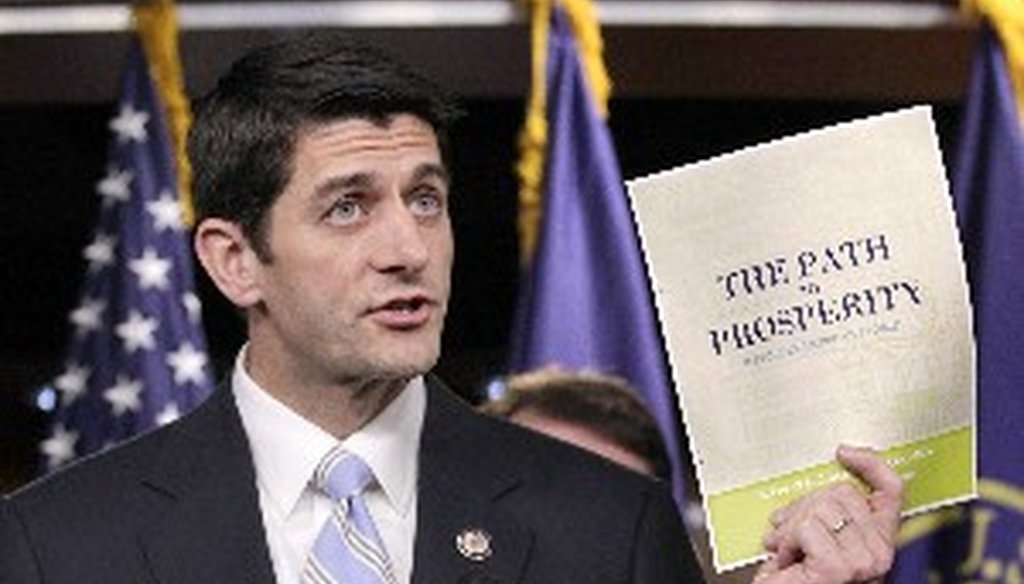Stand up for the facts!
Our only agenda is to publish the truth so you can be an informed participant in democracy.
We need your help.
I would like to contribute

Republicans did vote for Paul Ryan's budget plan. But did it end Medicare "as we know it"?
Here's a line you'll hear a lot between now and November: A Republican member of Congress "voted to end Medicare as we know it."
Incumbent Democratic Sen. Bill Nelson made the charge against U.S. Rep. Connie Mack IV in the Florida race for U.S. Senate. In the ad, called "Meet Connie," a narrator says Mack missed a lot of votes, but "still voted to end Medicare as we know it."
Democrats have been chanting "Republicans voted to end Medicare" since an April 2011 vote on a proposed budget from U.S. Rep. Paul Ryan, R-Wis., now the GOP vice presidential nominee. The claim -- often made bluntly and with no qualifiers -- was so pervasive, PolitiFact chose it as our 2011 Lie of the Year.
Since then, Democrats have altered their line to add this qualifier: "as we know it."
It’s a convenient way to amend a debunked attack line without abandoning it completely. But is it accurate?
When we thought about what it means to "end Medicare as we know it," we concluded that it means changing the program so that it becomes unfamiliar and dramatically different.
After researching all the angles and talking to many experts, we concluded that whether Ryan’s plan changes the program to that extent is more opinion than checkable fact.
One expert we interviewed said fact-checking whether Republicans end Medicare "as we know it" would be like trying to fact-check President Franklin Roosevelt’s famous statement, "We have nothing to fear but fear itself." (True: Fear is paralyzing! False: What about snakes?)
We should note that we previously fact-checked a counter-charge from presidential nominee Mitt Romney, that Obama’s health law "ended Medicare as we know it." We found that claim ridiculously wrong, and rated it Pants on Fire, because Obama’s plan left Medicare as a large, single-payer, federally run health care program for seniors -- slimmer in some areas, more generous in others, with a smattering of different rules.
Whether Ryan’s plan ended Medicare "as we know it" was not so clear cut. For a variety of reasons, it is a significant structural change to Medicare. As we’ll see, there are good arguments on both sides that it does or does not end Medicare "as we know it"
Here then is a review of the evidence. Read on and decide for yourself whether Republicans voted to "end Medicare as we know it."
Future plans for Medicare
Both parties agree Medicare is growing too fast. If the trend continues, the program will start to overwhelm the federal budget as Baby Boomers retire and medical costs go up.
Interestingly, both parties also seem to agree that the current system is inefficient and can be made to produce good outcomes at less cost.
But the parties differ about how to get there.
President Barack Obama and the Democrats prefer keeping Medicare largely as it is, but introducing more regulations, incentives and stronger oversight of payments to doctors and hospitals.
Ryan, Romney and the Republicans want to bring more private insurance companies into Medicare and let market pressures push costs down.
Specifically, Ryan’s plan keeps Medicare intact for people 55 or older -- a critical point that is often lost when the Democrats make sweeping attacks. But it restructures Medicare for future seniors by providing government subsidies for them to buy their own plans, from either traditional Medicare or private insurers. Ryan calls the plan "premium support," while Democrats say it's a voucher plan. Here at PolitiFact, we refer to "premium support" as voucher-like credits and rated Obama’s statement that Romney and Ryan "want to turn Medicare into a voucher system" as Mostly True.
In 2011, an early version of Ryan’s plan had no option for traditional Medicare and was more of a purely private program. In 2012, Ryan changed the plan to allow beneficiaries to use their credits to select traditional Medicare, and he made a number of other technical changes to address concerns that the credits wouldn’t keep up if medical costs kept going up and up. The amount a beneficiary receives, for example, would be based on the second least-expensive plan available on a Medicare exchange.
We should note that Ryan keeps a number of constraints on the private insurers: They would have to cover services stipulated by the federal government, and poor and sicker people would get larger subsidies. Romney has said he supports the Ryan plan’s goals and that his own plan for Medicare would be close to identical.
The problem for fact-checkers is that Ryan has not submitted his latest plan to the nonpartisan Congressional Budget Office, the independent scorekeepers in Congress who assess legislation and its ramifications. Without this scrutiny -- which uses sophisticated economic modeling to project outcomes -- it is difficult to make independent assessments about whether Ryan’s plan can meet its goals of comprehensive coverage at less cost without forcing beneficiaries to pay more.
The CBO found that Ryan’s first plan would shift costs to seniors so that they would pay about $6,000 more a year for the same coverage. The CBO has not released a similar analysis for the most recent plan.
The primary criticism of Ryan’s plan is that it will not drive down prices nearly as much as he hopes. That could mean that the credits don’t keep pace with the cost of the plans, so that beneficiaries would pay more out of pocket for the same coverage, or they lose benefits. Alternatively, the government could ratchet up the value of the credits, but that means the plan wouldn’t achieve its promised cost savings.
Ryan’s plan is certainly a significant change to the current Medicare program. But is it dramatic enough to say it "ends Medicare as we know it"? We talked to health policy experts to round up the arguments both for and against.
Yes, it ends Medicare as we know it
Several analysts we spoke with compared Ryan’s plan for Medicare with the trend of moving workers away from pensions and toward 401(k)s, changing the program from a defined benefit to a defined contribution.
"That’s a radical change in Medicare philosophy and practice, since from the start Medicare has always guaranteed benefits to its enrollees," said Jonathan Oberlander, a health policy professor at the University of North Carolina School of Medicine. "And Medicare cost containment efforts have historically imposed cuts on medical providers, not Medicare beneficiaries."
Right now, Medicare is largely a health insurance program run by the government for Americans over age 65, and the government determines what it pays hospitals, doctors and health care providers. It resembles a single-payer health care system, similar to that in Canada.
Under a new system, the influence of private health insurance companies would expand, and that would dilute the government’s power to negotiate lower reimbursement rates for older Americans, critics say.
There’s also the fear that private companies will be able to profit by cherry-picking the healthiest seniors, leaving the sickest seniors who require the most treatment on the government program. Proponents say Ryan’s plan includes risk adjustment to address that problem.
We should note that Medicare already has a private component, called Medicare Advantage. But the Medicare Advantage program has cost the government more than the traditional program. Obama’s health care law seeks to limit those extra payments to the private insurers. So while Medicare Advantage was supposed to bring the efficiency of competition from private insurers to Medicare, it has ended up costing more.
No, it doesn’t end Medicare as we know it
On the other side of the coin, proponents of the Ryan plan say it’s a new and better way of providing health insurance for older Americans.
"In short, Ryan's plan does not ‘end Medicare as we know it’," said Robert Moffit, a senior fellow at the conservative Heritage Foundation. "The only major difference is that the payment for coverage will be defined contribution, meaning that the government will transfer funds directly from its accounts to a plan of a person's choice, including traditional Medicare."
Moffit points out that the current Medicare system does that already, through Medicare Advantage and Medicare’s prescription drug program.
While Medicare Advantage hasn’t saved the government money, Ryan’s plan would be structured differently. Meanwhile, the drug program has come in below spending projections, which shows that competition can lower prices, say supporters of the plan.
Additionally, Ryan has made improvements to this year’s plans to address concerns about cost-shifting to beneficiaries, said Yuval Levin, a fellow at the Ethics and Public Policy Center and a former policy adviser to President George W. Bush.
"The benefit (that is, comprehensive insurance coverage) is defined, after all, and Medicare commits to funding it, and then has insurers compete to see how cheaply they can provide it," he said.
Finally, if the Ryan-Romney plan "ends Medicare as we know it," so does the health care law, by introducing the Independent Payment Advisory Board, a new board that will be charged with recommending changes to payments to make Medicare more efficient. When the board begins its work in later years, it can deny payments to providers in order to save money.
Those restrictions could result in reduced benefits, Moffit said, which is at odds with Democratic claims about the current programs "guaranteed" benefits.
"‘Guaranteed benefits’ in traditional Medicare, or any government entitlement, is a seductive phrase," Moffit said, "Congress can always change, eliminate, or modify such benefits. So, the ‘guarantee’ is nothing more than a political promise."
Gail Wilensky, who directed Medicare under President George H.W. Bush, said the charge of "ending Medicare as we know it" is a pointless attack, because the plans of both parties are proposing significant changes.
Both Obama and Ryan want to restrict Medicare growth to the same level, she said. (For policy wonks, that level is GDP per capita plus .05 percent, which means health care costs are limited to just a little more than overall economic growth.)
Again, it’s the mechanism for reining in Medicare’s growth that’s different. Obama’s health law puts the pressure on provider payments, while Romney and Ryan believe competition and private insurers will reduce costs.
"So the answer is yes, Medicare is ending as we used to know it, and both parties have embraced that, and for good reasons," Wilensky said.
Our Sources
U.S. House of Representatives,Path to Prosperity budget for fiscal year 2013, accessed Aug. 21, 2012
Congressional Budget Office,The Long-Term Budgetary Impact of Paths for Federal Revenues and Spending Specified by Chairman Ryan, March 20, 2012
Congressional Budget Office,CBO's Analysis of the Major Health Care Legislation Enacted in March 2010, March 30, 2011
The Kaiser Family Foundation,Health Reform and Medicare: Overview of Key Provisions, July 2010
The Kaiser Family Foundation, Comparison of Medicare Premium Support Proposals, July 2012
Interview with William Galston of the Brookings Institution, Aug. 10, 2012
Interview with Paul Van de Water of the Center on Budget and Policy Priorities, Aug. 21, 2012
Email interview with Jonathan Oberlander of the University of North Carolina-Chapel Hill, Aug. 16, 2012
Email interview with Robert Moffit of the Heritage Foundation, Aug. 16, 2012
Email interview with Yuval Levin of the Ethics and Public Policy Center, Aug. 20, 2012
Interview with Gail Wilensky, Aug. 17, 2012
PolitiFact, Lie of the Year 2011: 'Republicans voted to end Medicare,'Dec. 20, 2011
PolitiFact, Obama radio ad says Ryan-Romney plan will end Medicare and replace it with a voucher, Aug. 22, 2012
PolitiFact, Do Mitt Romney and Paul Ryan want to turn Medicare into a voucher program?, Aug. 16, 2012
PolitiFact, Barack Obama's 'Life of Julia' says Mitt Romney would replace Medicare with ‘nothing but a voucher’, May 24, 2012
PolitiFact, Mitt Romney says Barack Obama is "ending Medicare as we know it," March 22, 2012





















































